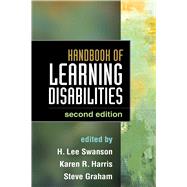New to This Edition:
*Incorporates key advances in identifying and remediating LD, with particular attention to the role of RTI.
*Chapters on social cognitive, behavioral genetic, and neurobiological aspects.
*Chapters on adolescents and adults with LD.
*Chapters on spelling instruction, history instruction, and classroom technology applications.
*Chapter synthesizing 21st-century advances in LD research methods, plus chapters on advanced statistical models, single-case designs, and meta-analysis.









